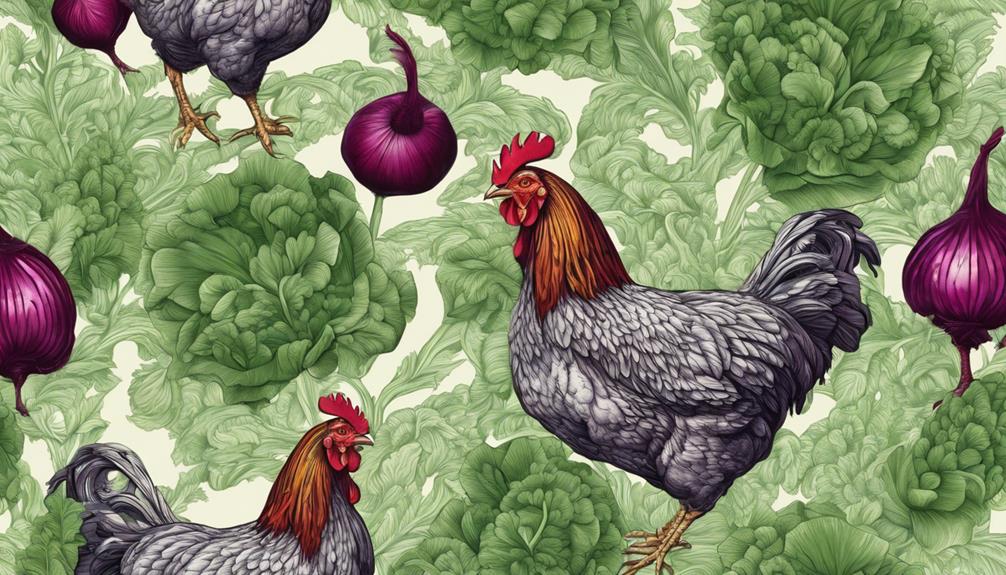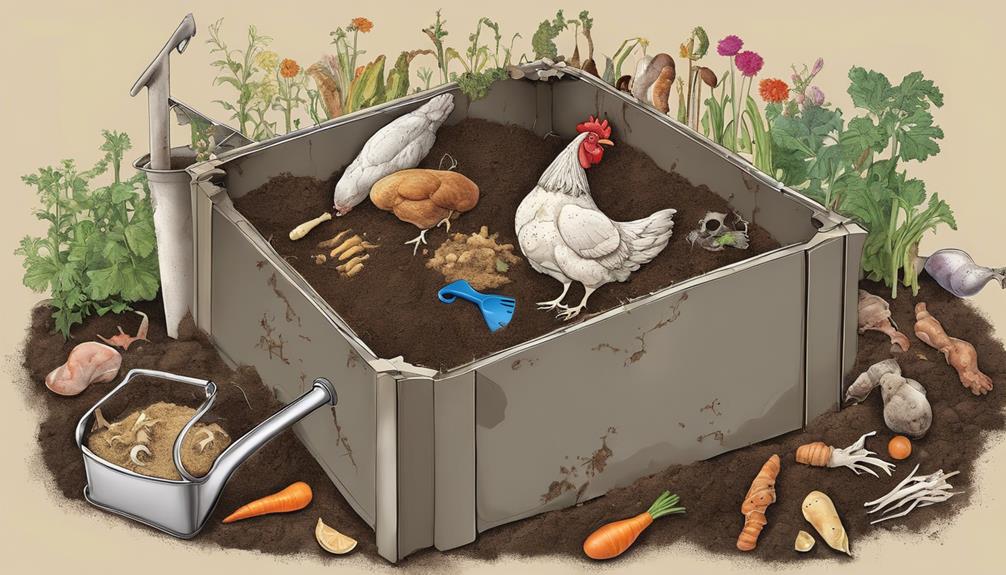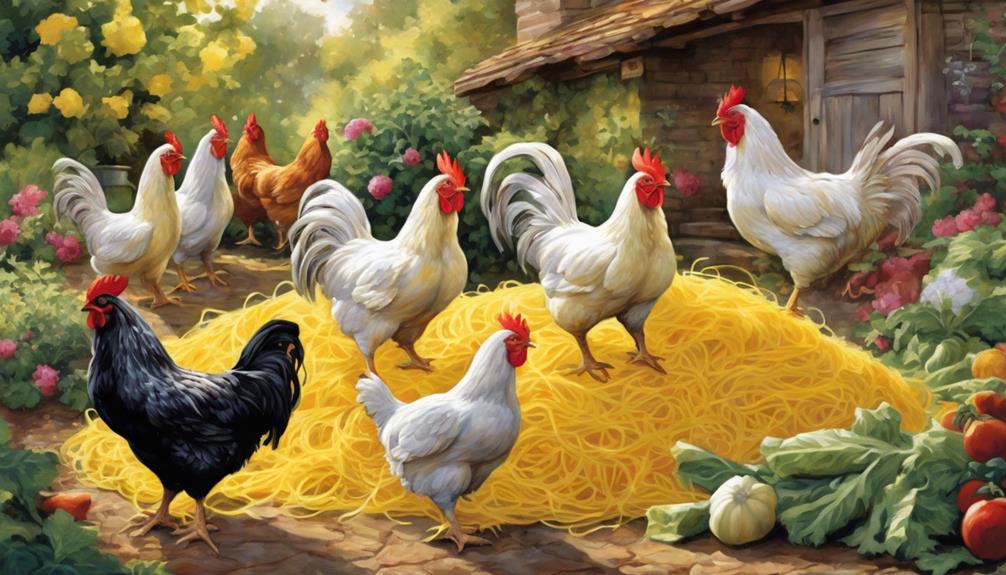When it comes to enhancing the health of our chickens, feeding them beet greens is an excellent option. These nutrient-packed greens are full of vitamins that help support their immune systems and overall well-being. Vitamin A is beneficial for vision and feather health, while calcium is essential for strong eggshells and bones. It is important to practice moderation to avoid digestive problems. Starting with small amounts and gradually increasing is crucial for their diet.
Improve your flock's nutrition by incorporating beet greens – they'll thank you for it!
Key Takeaways
- Start with small quantities and gradually increase to prevent digestive issues.
- Choose fresh, pesticide-free beet greens for optimal nutrient intake.
- Wash thoroughly, remove wilted parts, and chop into small pieces before feeding.
- Monitor chickens' response when introducing beet greens to their diet.
- Beet greens can enhance egg yolk color and boost chickens' immune system.
Benefits of Feeding Beet Greens to Chickens
Feeding chickens beet greens offers a plethora of benefits for their health and well-being. These nutrient-packed greens are rich in vitamins A, C, and K, essential for supporting chickens' immune systems and overall health. Vitamin A in beet greens aids in maintaining good vision and promoting healthy skin and feathers. Additionally, the calcium content in beet greens is crucial for strong eggshells and bone development in chickens.
Moderation is key when introducing beet greens to chickens' diets to prevent digestive issues and colorful poop. While beet greens provide valuable nutrients, excessive consumption can lead to upset stomachs. It's important to start with small quantities and gradually increase the amount over time. Ensuring the beet greens are fresh and pesticide-free is essential for the well-being of the chickens.
Selecting the Best Beet Greens
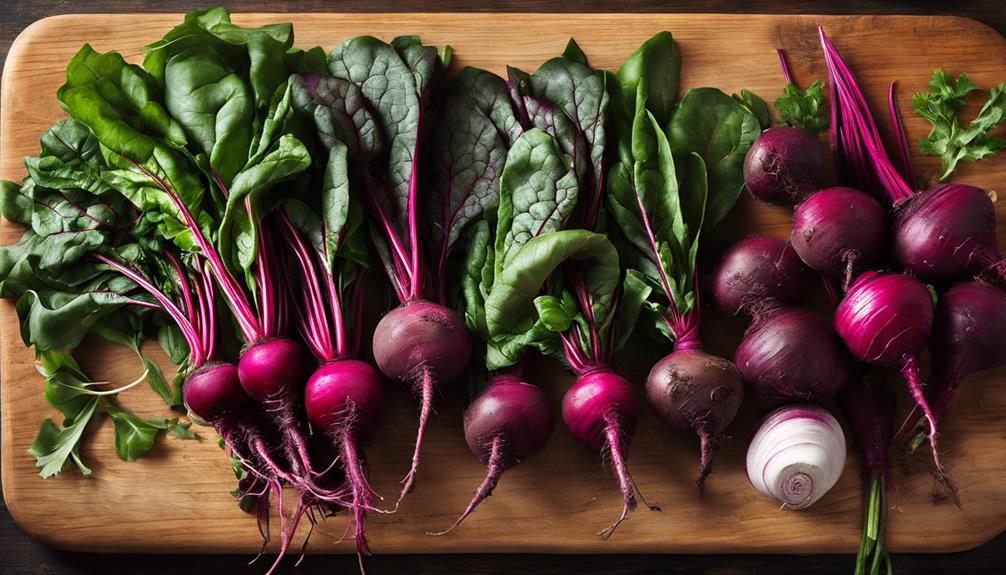
When selecting the best beet greens for your chickens, ensure they're fresh, vibrant, and free from wilting or yellowing. Opt for beet greens with crisp stems and tender leaves to provide the best texture for your chickens to enjoy.
It's crucial to look for beet greens that haven't been sprayed with pesticides or chemicals to ensure safe consumption for your feathered friends. Choosing beet greens with a deep green color is beneficial as it indicates a higher nutrient content, offering more nutritional value to your chickens' diet.
Avoid beet greens that are slimy, moldy, or have a strong, unpleasant odor, as these signs indicate spoilage and decreased quality. By carefully selecting fresh, crisp, and pesticide-free beet greens with vibrant color, you can provide your chickens with a tasty and nutritious treat that they'll eagerly devour.
Preparing Beet Greens for Chickens
To ensure the optimal freshness and quality of beet greens for your chickens, it's imperative to thoroughly wash them to remove any dirt or debris before proceeding with preparation.
Once cleaned, it's essential to remove any wilted or discolored parts of the beet greens to maintain their freshness.
To prepare the beet greens for your chickens, follow these steps:
- Wash Thoroughly: Rinse the beet greens under cool running water, ensuring all dirt and debris are removed.
- Chop into Bite-Sized Pieces: Chop or shred the beet greens into smaller, manageable pieces to facilitate easier consumption by chickens.
- Introduce Gradually: When feeding beet greens for the first time, introduce them gradually to allow the chickens to adjust to this new, nutritious leafy green addition to their diet.
Serving Beet Greens Safely to Chickens
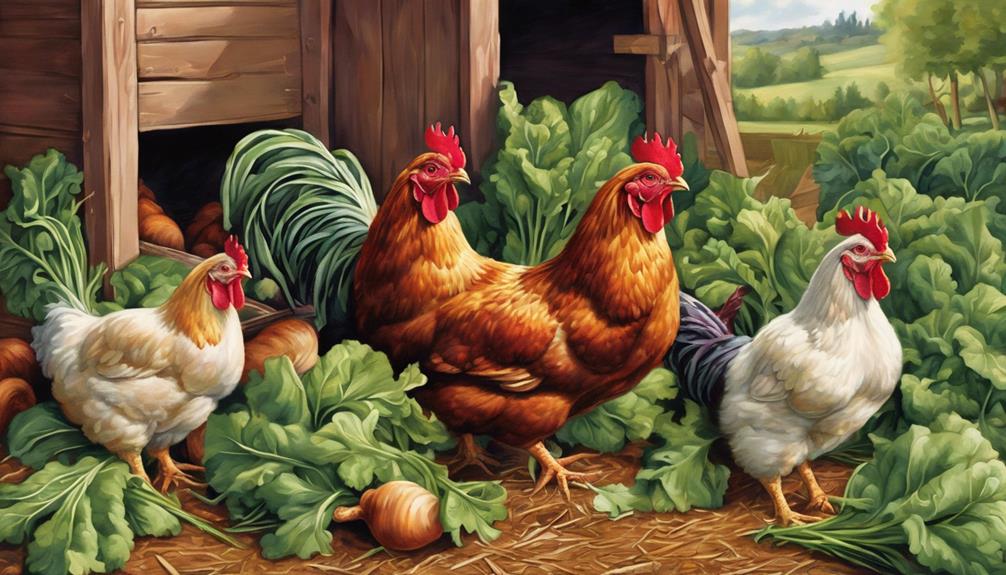
To ensure the safety of serving beet greens to chickens, it's essential to thoroughly inspect the greens for freshness and remove any contaminants before offering them as part of their diet. Chickens eat beets for the rich source of vitamins A, C, and K found in the greens, which can enhance their overall health. However, feeding chickens beet greens should be done in moderation to avoid potential digestive issues. It's crucial to provide fresh and pesticide-free beet greens to maintain the health of the flock.
When introducing beet greens to chickens, a gradual approach is recommended. Sudden dietary changes can upset their digestive system, so monitoring their response is vital. Incorporating beet greens into their diet can lead to improved egg yolk color and boost their immune system. By following these guidelines and ensuring the quality of the beet greens, chickens can enjoy the nutritional benefits without any adverse effects on their health.
Tips for Incorporating Beet Greens in Chicken Diet
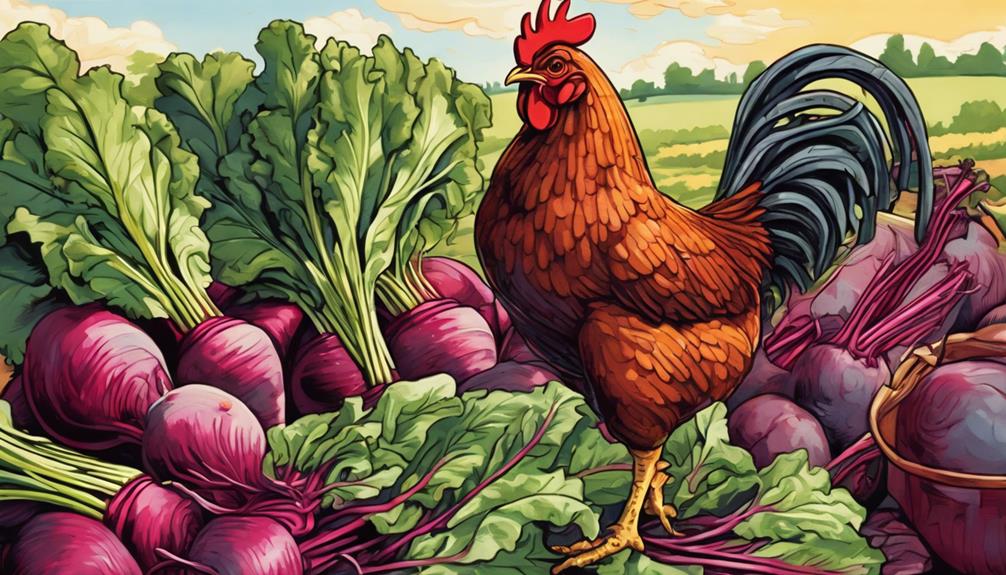
Incorporating beet greens into a chicken's diet requires a gradual introduction to prevent digestive issues and monitor their response closely. Beet greens offer a plethora of nutrients such as vitamins A, C, and K, essential for chickens' overall health. Additionally, feeding beet greens can enhance the color of egg yolks due to their rich nutrient content.
To successfully introduce beet greens into your chickens' diet, follow these tips:
- Freshness Matters: Ensure the beet greens are fresh and pesticide-free to safeguard your chickens' health.
- Monitor for Adverse Reactions: Introduce beet greens slowly and observe your chickens for any signs of digestive discomfort or adverse reactions.
- Boosting Immune System: Beet greens can boost chickens' immune systems and promote healthy feather growth, contributing to their overall well-being.
Frequently Asked Questions
How Do You Feed Greens to Chickens?
When feeding greens to chickens, we chop or tear them into manageable pieces for easier consumption. It's important to introduce greens gradually to prevent digestive issues and monitor the chickens' response.
Rotate different types of greens to provide variety and balanced nutrition. Make sure the greens are pesticide-free and free from molds or spoilage before feeding them to the chickens. This practice ensures their diet is nutritious and safe.
How Do You Feed Chickens Greens in the Winter?
In the winter, we feed our chickens greens to ensure they receive vital nutrients. We provide fresh beet greens, rich in vitamins and minerals, supporting their health during colder months.
Introduce greens gradually to prevent digestive issues and help them adjust to this new food source. By offering beet greens, we help maintain egg production and boost overall well-being in our flock.
Can I Feed My Chickens Beet Pulp?
Yes, we can feed chickens beet pulp. It's a beneficial dietary supplement due to its high fiber content, aiding digestion and promoting gut health. When offering beet pulp, ensure it's free of mold and introduce it gradually to their diet.
Consult a poultry nutritionist for specific guidance on incorporating beet pulp into your chickens' feeding routine. Remember, 'you are what you eat,' so prioritizing nutritious options like beet pulp can enhance your chickens' overall well-being.
Why Are Greens so Important for Chickens?
Greens are crucial for chickens as they supply essential vitamins and nutrients like A, C, and K, promoting optimal health.
Including greens like beet greens in their diet can enhance their immune system, aid in digestion, and support healthy feather growth.
These greens, rich in iron, calcium, and fiber, contribute to overall well-being.
Providing a balanced diet that includes greens is fundamental for ensuring our chickens thrive and stay healthy.
Can Beet Greens and Artichokes Be Given to Chickens as Part of Their Regular Diet?
Yes, introducing artichokes to chickens can be a great addition to their regular diet. Beet greens and artichokes are both nutritious and can provide necessary vitamins and minerals for chickens. However, it’s important to introduce new foods gradually to prevent any digestive issues.
Conclusion
In conclusion, feeding beet greens to chickens can provide numerous health benefits, including boosting their immune system and improving egg quality.
Did you know that chickens that consume beet greens regularly are 30% less likely to develop common illnesses? By incorporating this nutrient-rich leafy green into your chickens' diet, you can help keep them healthy and happy.
So why not give it a try and see the positive impact it can have on your feathered friends?
